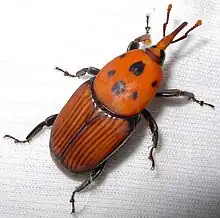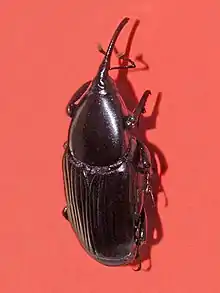Rhynchophorus
Rhynchophorus, or common name palm weevils, is a genus of beetles in the weevil family, Curculionidae. Palm weevils are major pests of various trees in the family Arecaceae throughout the tropics including: coconut (Cocos nucifera), Areca catechu, species of the genus Phoenix, and Metroxylon sagu.[3] Two species are invasive pests outside their native ranges, Rhynchophorus ferrugineus[4] and Rhynchophorus palmarum.[5]
| Rhynchophorus | |
|---|---|
 | |
| Rhynchophorus ferrugineus | |
| Scientific classification | |
| Domain: | Eukaryota |
| Kingdom: | Animalia |
| Phylum: | Arthropoda |
| Class: | Insecta |
| Order: | Coleoptera |
| Infraorder: | Cucujiformia |
| Family: | Curculionidae |
| Subfamily: | Dryophthorinae |
| Tribe: | Rhynchophorini |
| Genus: | Rhynchophorus Herbst, 1795 |
| Species[1] | |
|
10 species; see text | |
| Synonyms | |
| |
Species
| Image | Common name | Scientific name | Native distribution |
|---|---|---|---|
 | black palm weevil | Rhynchophorus bilineatus (Montrouzier, 1857) | Moluccas, Papua New Guinea and Solomon Islands |
Top.JPG.webp) | palmetto weevil | Rhynchophorus cruentatus (Fabricius, 1775) | Florida, but has been found as far as southern Texas to the west and South Carolina to the north. |
| Rhynchophorus distinctus Wattanapongsiri, 1966 | Kalimantan | ||
.jpg.webp) | red palm weevil | Rhynchophorus ferrugineus (Olivier, 1790) (aka Calandra ferruginea (Fabricius, 1801)) | tropical Asia, Sri Lanka and the Philippines |
| Rhynchophorus labatus Ritsema, 1882 | Sumatra | ||
 | South American palm weevil | Rhynchophorus palmarum (Linnaeus, 1758) | Argentina to Paraguay and north through South and Central America to central Mexico and the Caribbean (Barbados, Dominica, Grenada, Guadeloupe, Martinique, Saint Lucia, Saint Vincent, Grenadines, Trinidad and Tobago, and perhaps Cuba, Dominican Republic, and Puerto Rico |
 | African palm weevil | Rhynchophorus phoenicis (Fabricius, 1801) | Senegal to Ethiopia and South Africa. |
| Rhynchophorus quadrangulus Quedenfeldt, 1888 | Cameroon | ||
| Rhynchophorus richteri Wattanapongsiri, 1966 | |||
 | Sago palm weevil | Rhynchophorus vulneratus (Panzer, 1798) | Indonesia, Malaysia, Myanmar, Singapore, and Thailand |
References
- Wattanapongsiri, A. 1966. A revision of the genera Rhynchophorus and Dynamis (Coleoptera: Curculionidae). Department of Agriculture Science Bulletin 1: 1-328
- Rhode, B.E.; Crosby, T.K. (16 July 2012). "Red Palm Weevil - Other Names". Plant Biosecurity Cooperative Research Centre - PaDIL. Archived from the original on 5 November 2016. Retrieved 5 November 2016.
- Giant palm weevils of the genus Rhynchophorus (Coleoptera: Curculionidae) and their threat to Florida palms. Archived 2016-03-05 at the Wayback Machine Pest Alert. Florida Department of Agriculture and Consumer Services. 2010.
- Rugman-Jones P.F., Hoddle C.D., Hoddle M.S., Stouthamer R. (2013). "The Lesser of Two Weevils: Molecular-Genetics of Pest Palm Weevil Populations Confirm Rhynchophorus vulneratus (Panzer 1798) as a Valid Species Distinct from R. ferrugineus (Olivier 1790), and Reveal the Global Extent of Both". PLoS ONE. 8 (10): e78379. Bibcode:2013PLoSO...878379R. doi:10.1371/journal.pone.0078379. PMC 3797061. PMID 24143263.
{{cite journal}}: CS1 maint: multiple names: authors list (link) - Biology and Management of South American Palm Weevil, Rhynchophorus palmarum (L.) (Coleoptera: Curculionidae), in California
This article is issued from Wikipedia. The text is licensed under Creative Commons - Attribution - Sharealike. Additional terms may apply for the media files.